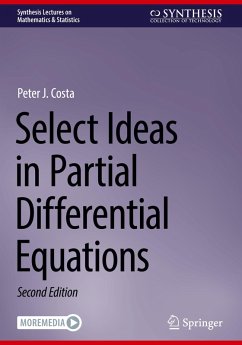This book provides a concise but thorough introduction to partial differential equations which model phenomena that vary in both space and time. The author begins with a full explanation of the fundamental linear partial differential equations of physics. The text continues with methods to understand and solve these equations leading ultimately to the solutions of Maxwell's equations. The author then addresses nonlinearity and provides examples of separation of variables, linearizing change of variables, inverse scattering transform, and numerical methods for select nonlinear equations. Next, the book presents rich sources of advanced techniques and strategies for the study of nonlinear partial differential equations. This second edition includes updates, additional examples, and a new chapter on reaction-diffusion equations. Ultimately, this book is an essential resource for readers in applied mathematics, physics, chemistry, biology, and engineering who are interested in learning about the myriad techniques that have been developed to model and solve linear and nonlinear partial differential equations.
Bitte wählen Sie Ihr Anliegen aus.
Rechnungen
Retourenschein anfordern
Bestellstatus
Storno

